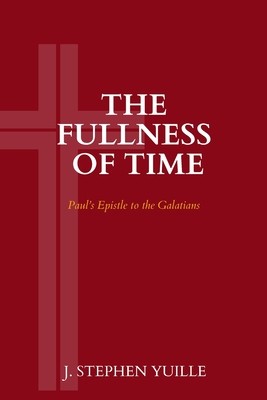
- Išsiųsime per 12–18 d.d.
- Autorius: J Stephen Yuille
- Leidėjas: H&e Publishing
- ISBN-10: 1774840804
- ISBN-13: 9781774840801
- Formatas: 15.2 x 22.9 x 1.1 cm, minkšti viršeliai
- Kalba: Anglų
- Extra -15 % nuolaida šiai knygai su kodu: ENG15
Atsiliepimai
Aprašymas
How can sinners be righteous in God's sight? Is there a more important question than this? The answer is by grace alone through faith alone in Christ alone. In a word, Christ does it all. He achieves righteousness in his obedience, and he satisfies God's offended justice by his death upon the cross. The implication is that we're completely passive. We simply receive Christ through faith and, as a result, "we become the righteousness of God in him" (2 Cor. 5:21). Our faith pays nothing, merits nothing, and contributes nothing. That's exceedingly good news! But what happens if we add something to this good news? Intentionally or not, we end up denying the sole sufficiency of Christ. This was the case among the churches of Galatia, and it is what caused the apostle Paul to put pen to paper and provide a powerful and persuasive defense of the gospel. In The Fullness of Time, Dr. J. Stephen Yuille traces Paul's defense and, in so doing, provides a soul-refreshing analysis of this glorious truth-Christ's sole sufficiency. Here indeed is the difference between feast and famine, fullness and emptiness, an eternity of joy and an eternity of sorrow.
EXTRA 15 % nuolaida su kodu: ENG15
Akcija baigiasi už 4d.11:19:24
Nuolaidos kodas galioja perkant nuo 10 €. Nuolaidos nesumuojamos.

- Autorius: J Stephen Yuille
- Leidėjas: H&e Publishing
- ISBN-10: 1774840804
- ISBN-13: 9781774840801
- Formatas: 15.2 x 22.9 x 1.1 cm, minkšti viršeliai
- Kalba: Anglų Anglų
How can sinners be righteous in God's sight? Is there a more important question than this? The answer is by grace alone through faith alone in Christ alone. In a word, Christ does it all. He achieves righteousness in his obedience, and he satisfies God's offended justice by his death upon the cross. The implication is that we're completely passive. We simply receive Christ through faith and, as a result, "we become the righteousness of God in him" (2 Cor. 5:21). Our faith pays nothing, merits nothing, and contributes nothing. That's exceedingly good news! But what happens if we add something to this good news? Intentionally or not, we end up denying the sole sufficiency of Christ. This was the case among the churches of Galatia, and it is what caused the apostle Paul to put pen to paper and provide a powerful and persuasive defense of the gospel. In The Fullness of Time, Dr. J. Stephen Yuille traces Paul's defense and, in so doing, provides a soul-refreshing analysis of this glorious truth-Christ's sole sufficiency. Here indeed is the difference between feast and famine, fullness and emptiness, an eternity of joy and an eternity of sorrow.


Atsiliepimai